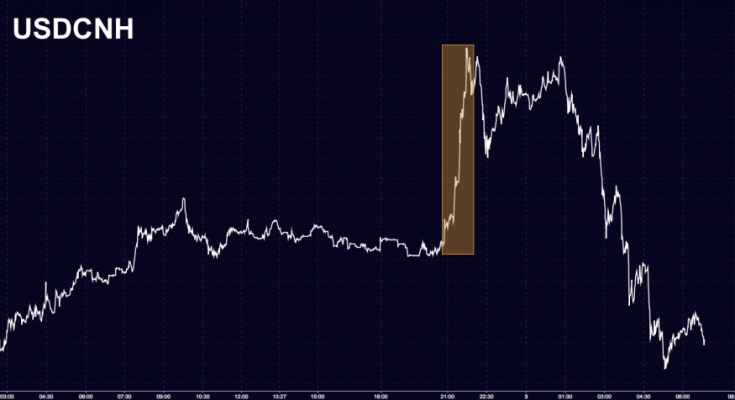“USD/CNH has effectively risen a straight line in early Tuesday business and that is too much, too quickly,†Bloomberg’s Mark Cranfield wrote at 9:57 PM, New York time on Monday, adding that the currency “may have more to weaken ahead of July 6 as traders price a full trade war, but a move of this velocity is likely to bring an official rebuke in some form [and] investors will now be on high alert for official push back.â€
Mark was referring to the yellow highlight in the following chart, which shows the offshore yuan weakening past 6.70 on the way to, there for about 45 minutes, seemed like “God only knows whereâ€.

That opening plunge was off course just the latest leg weaker for the yuan, which is falling against the dollar at an unprecedented rate thanks to trade frictions, policy divergence between the U.S. and China, a decelerating economy and generally negative sentiment. Here’s the bigger picture:

Â
As Deutsche Bank’s Alan Ruskin put it on Monday, “the extent of liquidity [in China] may well reflect tension between the official desire to achieve the trifecta of: i) supporting risky assets, ii) easing liquidity tensions, and, iii) supporting the currency [and] so far the currency is the obvious loser.â€
Well, as you can see in the first chart above, the PBoC did intervene around 2:00 AM ET and that intervention came in the form of jawboning from Yi Gang himself who, in a statement posted to the PBoC’s website, said this:
Recently the foreign exchange market has shown some volatility and we’re paying close attention to that. [It’s] mainly due to factors such as a stronger dollar and external uncertainties, and there’s been some pro-cyclical behavior.
He also repeated that standard line about “prudent, neutral policyâ€.
Earlier in the session, PBOC deputy governor (and SAFE head) Pan Gongsheng told a conference in Hong Kong that China has plenty of FX reserves and other FX “tools†and is “confident†that they can keep the currency stable.

